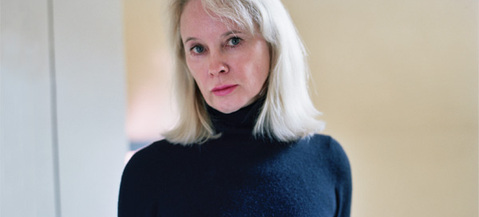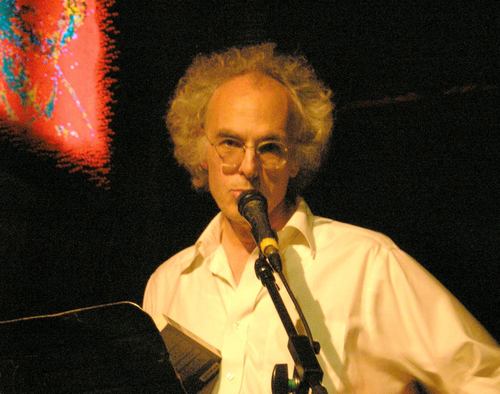
A Survey of Writers on Contemporary Writers
Listening to writers read and discuss their work at Newtonville Books, the bookstore my wife and I own outside Boston, I began to wonder which living, contemporary writers held the most influence over their work. This survey is not meant to be comprehensive, but is the result of my posing the question to as many writers as I could ask.
MARY GAITSKILL

© edrants.com
ALICIA ERIAN: In college, my friend lent me her copy of Mary Gaitskill’s first book, a collection of stories entitled Bad Behavior, and said I should read it. What exactly that should meant wasn’t clear, but my friend was one of the best dressers I’d ever known, and this caused me to take her literary recommendations very seriously.
I connected with the disconnected misery of Gaitskill’s characters. They depressed the hell out of me, but they never bored me. I always needed to know what was going to happen to them. They mirrored my own emptiness, and from this I inferred that I had a shot at being interesting as a person, too.
Most especially, I connected with the story “Secretary.” It made me incredibly horny, and incredibly ashamed of being horny, since what was making me horny wasn’t something that was good for the main character, whose boss was sexually abusing her. At the same time, as a wannabe writer, I was aware that what Gaitskill had accomplished in terms of eliciting these conflicting responses from me was the apex of literary success. Gaitskill had revealed to me who I was—my basest instincts—before I’d even understood such things myself. I didn’t know her, but somehow, she really, really knew me. I hoped to offer the same experience to another reader one day.
ELLIOTT HOLT: I was in college—this was nearly twenty years ago—when I read Mary Gaitskill’s story, “A Romantic Weekend.” Everything about it was a revelation: the deadpan title; the cool, unsentimental tone; the confident shifts in perspective; the taut sentences. The subject matter was revelatory, too: I had never read a story about sadomasochism before. In fact, I had never before read something so unsparing in its description of “romance” and desire. “A Romantic Weekend” is a story about disappointment, mostly: the man is a sadist and discovers, in their weekend away, that his new lover is not the true masochist that he thought she was. They are not sexually compatible. But once they let go of their rigid definitions and ideas of one another, they actually connect—briefly (we know it won’t last)—as human beings. Gaitskill’s sharp descriptions are unforgettable: “In the big coat he looked like the young pet of a budding secret police force. She thought he was beautiful,” observes her female protagonist, Beth. Meanwhile Beth’s sadistic lover thinks: “She was in love with the idea of intelligence, and she overestimated her own.”
I devoured Gaitskill’s first collection Bad Behavior. And then, some ten years later, when I was getting my MFA, her stunningly good novel Veronica was published. (I recently reread it and it’s even better than I remembered: the fierce voice is amazing.) Gaitskill is a brave writer: reading her gave me permission to take risks in fiction. And in 2006, while I was still in graduate school, I sent my first finished short story, “Evacuation Instructions,” to the Zoetrope: All-Story annual short fiction contest. Mary Gaitskill was the judge. Over 1500 stories were submitted to the contest that year, but I won 2nd prize. It was the first time that I had been paid ($500!) for my fiction and it was the first time that I felt like a “real” writer. I had never been published. But Mary Gaitskill had read my story and liked it enough to give it an award. It was just the encouragement I needed to keep writing, to believe in my voice. I’ll be forever grateful.
JAMES SCOTT: I think Mary Gaitskill is a badass. In fact, I think it’s that very quality that draws many young writers to her. She’s unflinching, and this, too, is influential. The problem arises from young writers pretending to be Gaitskill. In doing so, they often abuse their characters not for the sake of characterization, but for some misguided sense of ‘reality.’ Of course, lots of writers have this effect (Denis Johnson is one of the other oft-cited influences in this regard) but there’s something especially gritty about Gaitskill that enamors people.
DAVID GATES

© WikiCommons
JIM GAVIN: David Gates terrifies me. His novels make me laugh out loud—the coke-fueled jam session in Preston Falls is one of my all-time favorite comic set pieces, up there with Sebastian Dangerfield’s London bender in The Ginger Man and Frederick Exley’s last night with Mr. Blue in A Fan’s Notes—but Gates only seems capable of providing the kind of laughter that might come upon a man who’s facing a firing squard. A dread cackle that spooks the ravens from the trees. Gates is peerless in his depection of male depravity, but his characters are not rogue outsiders, bravely marauding through the American night. His bastards hide in plain sight. They have familes, corporate jobs, front lawns, mortgages. They like to BBQ and watch the ball game. They love these suburban ideals, even though they know it’s all bullshit, but they also want desperately to escape, to recapture the promise and anarchy of their youth, and they try sometimes, but only in half-ass fashion, because they know, in their battered hearts, that wanting to escape is just another cliche, another form of bullshit, and so one evening, unable to reconcile their dreams and desires and horrible self-knowledge, they wander down to the basement and intentionally shoot themselves in the hand.
J.G. Ballard said: “The suburbs are far more sinister places than most city dwellers imagine. Their very blandness forces the imagination into new areas. I mean, one’s got to get up in the morning thinking of a deviant act, merely to make certain of one’s freedom.” If nothing else, Gates’ dickish heroes want freedom, a simple but essential wish, and maybe this is why I’m so willing to follow them as they sink into the Slough of Despond and trudge their way through the Valley of Humiliation. They are degenerates, but this is the source of their honesty. They are incapable of lying to themselves. Every thought is undercut by the next, every motive gets questioned, every truth gets dismissed as an illusion. Gates captures this ongoing mental calculus in masterful style. First, let it be said that no living writer makes better use of italics. Especially in his dialogue, which by itself is worth the price of admission. But once he gets inside his characters’ heads—“Some inner life, boy”—you don’t have a chance. You will plunge to the bottom. You will watch each of these men become their own firing squad. Not a single sentences stands out as “beautiful” or, God help us, “lyrical,” but the cumulative effect of the voice—jittery and rhythmic and faithful to the vernacular—is so hypnotic, so pitch perfect, that you’re never distracted by a sentence trying too hard. It all goes down so easy. You forget that you’re reading. The book dissolves in your hands and it’s more like you’re listening to music. Hilarious and terrifying music.
–
Alicia Erian is the author of the story collection The Brutal Language of Love, and the novel Towelhead
Elliott Holt is the author of the novel You Are One of Them
James Scott is the author of the novel The Kept
Jim Gavin is the author of the short story collection Middle Men
Lettering by Caleb Misclevitz
–




